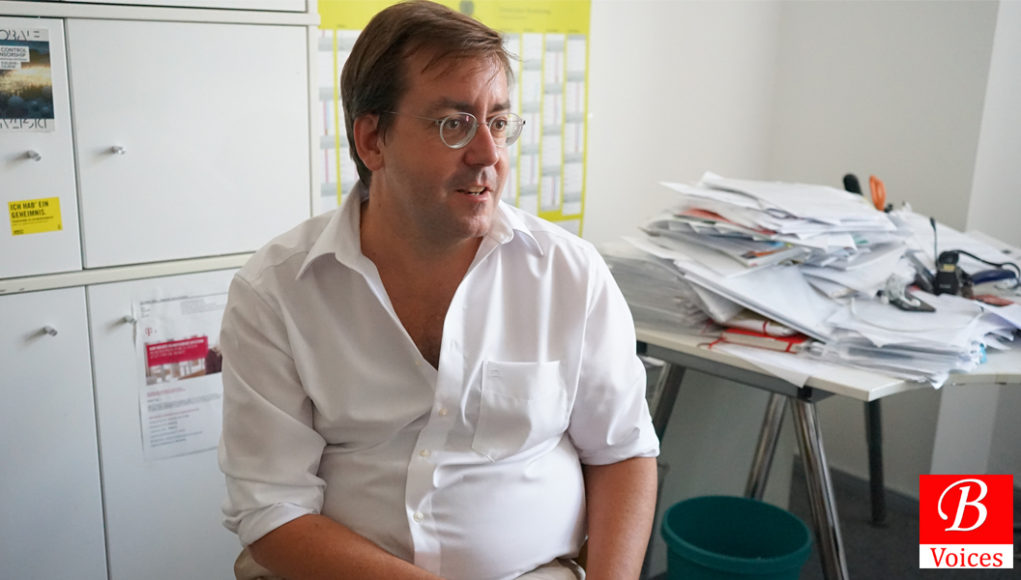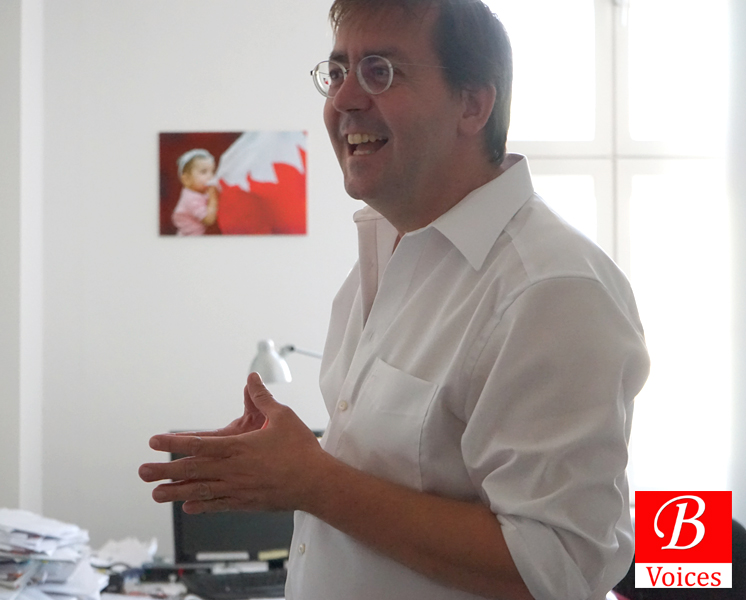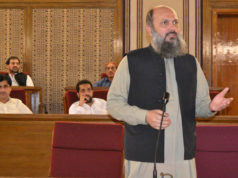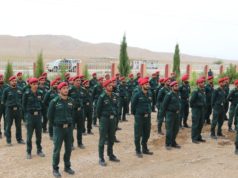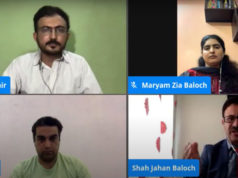Interview by: Adnan Aamir
Christian Mihr is Managing Director of Reporter Ohne Grenzen, the German Chapter of Reporters Without Borders (RSF) International. He has been leading German chapter of RSF since 2012. Prior to that, He worked as a journalist and editor for newspapers and news agencies. As a trained journalist He reported from South America and Ecuador. He has taught Journalism in Southern Russia for a while.
Adnan Aamir, Editor of Balochistan Voices interviewed Mr. Mihr in Berlin about the role of RSF Germany in press freedom.
Adnan Aamir: Is there any difference in the mandate of RSF Germany and RSF international?
Christian Mihr: In terms of mandate there is no difference because RSF Germany is a part of RSF international. At RSF Germany, we have to be careful that we are following the same line and the same approach because as an NGO it’s important that we speak with one voice. Sometimes in a global organization, there are sometimes inter-cultural discussions. However, it gives us the strength that we are not following a different agenda. In the end its no different for the people on the ground if someone is working for RSF International or RSF Germany.
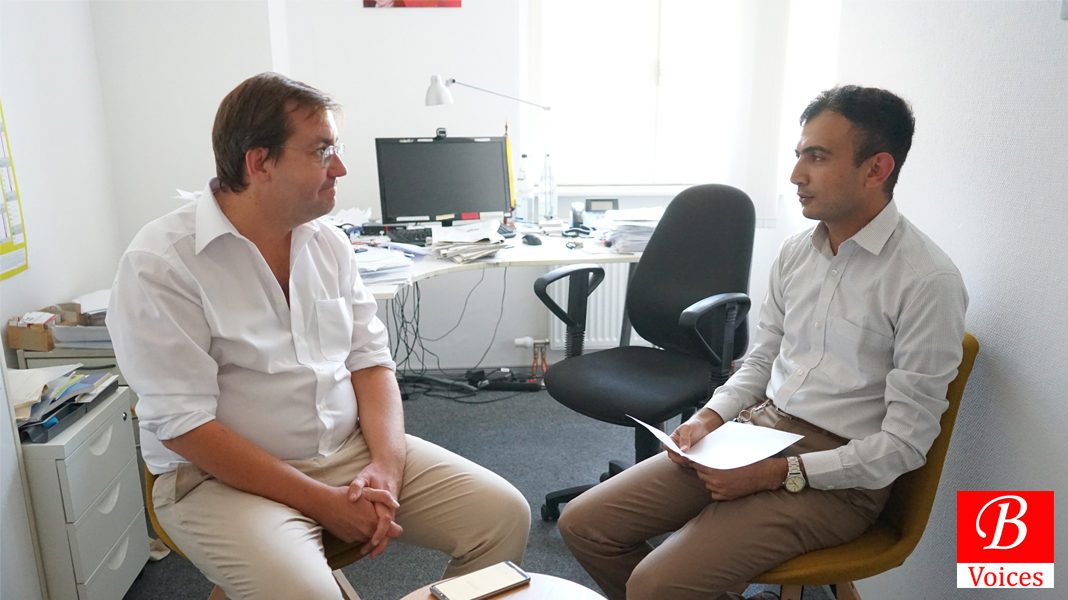
How important is free press for a country like Pakistan?
First of all, at a global level, we believe that freedom of the press is a precondition for executing fundamental human rights. Freedom of press actually enables the societies to discuss different views and opinions and it offers a platform for finding solutions. Coming to Pakistan, it’s a society with many internal differences and conflicts, where religion plays a strong role not only as a religious factor bust also as power and societal factor. Free press in a country like Pakistan can provide a platform to provide solutions for myriad problems facing the country. Free media can also hold power accountable in Pakistan.
People have to realize that it makes a difference living in a society with a higher level of press freedom. They also have to realize the connection between press freedom and economic development. For example, in Turkey there is an economic crisis and media is under pressure not to report the problems with the economy. This at the end results in creating uncertainty for the businesses who rely on media to get data. People have to realize that their personal situation can be better if the media reports negative things in society.
World Press Freedom Index issued by RSF is the most famous index to measure press freedom around the globe. In the latest index, Pakistan is ranked 142 out of 180. There are people in Pakistan who think that this ranking is still generous and Pakistan should be ranked further down the index. How do you respond to this?
This question not only comes from Pakistan but from many countries all over the world. World Press Freedom Index provokes the discussion about the importance of press freedom and this is exactly what we want. For instance, President of South Korea two years ago publically said that one of his goals would be to improve the ranking of his country in world press freedom index. We perceive this index as a pressure building tool because we are a watchdog organization. This index is based on a measurement and we have to be credible about the methodology behind it. This index always involves a comparison, which is always subjective to some extent. We try to improve this methodology from year to year.
People have to realize that their personal situation can be better if media reports the negative things in the society – Christian Mihr
Recently, RSF Germany collaborated with Freedom Network Pakistan to produce Media Ownership Monitor report on Pakistan. As per the findings of the report, Pakistan is a high-risk country where more than half of the media ownership is concentrated in a few hands. How this affects press freedom in Pakistan?
Press freedom is not only about journalists and their safety but also about media as a business. Media Ownership Monitor report displays the weakness in the media ownership structure of Pakistan. If there are powerful interests influencing media, then it’s not a favorable situation. This report offered Pakistani society with a reason to start a debate on the topic of media ownership. The reactions to Media Ownership Monitor report in Pakistan from academia, civil society, and independent journalists were quite interesting. Even the government authorities were not publically applauding these results.
Belt and Road Initiative (BRI) is one of the most discussed projects in media at the moment. As a media watchdog, do you perceive BRI as a difficult project for the journalists to report on?
This spring RSF issued a major report on the global media strategy of China. People very often only talk about the silk road strategy and not about the investments of China in the global media market, which are underestimated. The Chinese government wants that global public follow their authoritarian and dictatorial narrative of the society and media. For this, they are heavily investing in the global media. So, I think the media should report on the issue of BRI. I have the impression that BRI is often very much under-reported due to the influence of China in global media. Media often focuses on the short term implications of China’s investments but not on the long term implications of those investments.
People very often only talk about the Chinese investments in silk road but not in the global media market – – Christian Mihr
RSF Germany and RSF international are based in Berlin and Paris respectively. Do you think that German and French governments are doing enough on the diplomatic front to support freedom of media in countries like Pakistan?
Yes, and No. I would like to differentiate between individual assistance and collective support to press freedom. There is sometimes flexibility for individual assistance cases by German and other European governments but that’s also changing. Generally, I am not happy with the contradictory policy, which European governments in general and German and French governments, in particular, are following because of their interests. To put it frankly, the human rights approach towards a country is very strong when the interests of Germany and France are negligible in that country. RSF is heavily criticizing this lack of consistency in Human rights policy towards a lot of countries. In the case of Pakistan, there are some interests of these governments due to the geopolitical situation. Germany is following the realpolitik approach and it has different interests. This lack of consistency in policy towards countries like Pakistan is not promising but it’s not something specifically German. Many other western countries are doing the same.
What the civil society in the west can do to improve the state of freedom of the press in a country like Pakistan?
The starting point is that the demand for freedom of the press should come from within the society. It will not be useful if the west tells people in Pakistan to have a free press. Civil societies in the west should be alert and fight against inconsistencies in policies of their government because these inconsistencies allow governments like Pakistan to criticize Germany for not being credible with their approach. Moreover, RSF believes that press information is a universal right, which is not a German, French or Pakistani idea but a global idea. Countries like Pakistan and Germany have signed the universal declaration of human rights and article 19 on the freedom of information. We have to empower the civil society in Pakistan so that they can articulate this idea to their government.
Photo Credits: Salonika Hutidi
Disclaimer: Views expressed in this article are those of the interviewee and Balochistan Voices not necessarily agrees with them.
Share your comments!


